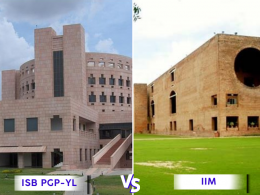- Understanding MBA for Healthcare Professionals
- Understanding Healthcare Management
- Benefits of an MBA for Doctors
- MBA for Dentists, Doctors, and Medical Professionals: Eligibility
- Best Specialization in MBA for Doctors
- Popular Job Roles After an MBA for Healthcare Professionals
- Top Universities for an MBA for Doctors
- Conclusion
The idea of pursuing an MBA might not seem convincing at first to doctors, dentists, and other medical professionals, but it is increasingly becoming a powerful move. While a clinical expertise may offer invaluable credibility, paired with management acumen, it can open avenues to new health tech ventures, hospital management, and many other leadership-driven roles in the healthcare field.
To support this information, data from Google Trends shows an almost 20% increase in queries for “MBA after MBBS” over the last 12 months. Additionally, the Graduate Management Admission Council(GMAC) published a recent report stating that 76% doctors pursued an MBA to come back to the healthcare industry with better skills and competitiveness. So, read on to find out how pursuing an MBA from a reputed institute can help you elevate your career as a healthcare professional.
Understanding MBA for Healthcare Professionals
There has been a drastic shift in MBA applications over the years in major schools and universities. Now, students from all professions are considering an MBA for greater recognition, enhanced leadership skills, and a deeper understanding of organisational behaviour, among other benefits. MBBS and the healthcare industry are no different. An MBA in healthcare-related expertise can offer varied career options for doctors.
Understanding Healthcare Management
Healthcare management is a vital element of every economy, relying heavily on both medical expertise and business strategies to manage facilities effectively. It requires the implementation of policies, managing day-to-day operations, managing medical costs, ensuring the well-being of patients, and cordial relations among the hospital staff.
Benefits of an MBA for Doctors
- An MBA for healthcare professionals provides a deep understanding of leadership strategies and marketing principles. It also instils an understanding of strategic management, organisational behaviour, and team management, which are needed by doctors at senior levels.
- Today’s times require doctors to adopt strategic thinking to seize better opportunities, overcome hurdles, and adapt to changing updates in the industry. An MBA for doctors fosters these skills efficiently, in a structured way.
- An MBA in Healthcare can open a wide network of professionals across the globe. These can help in better mentorship, collaboration, and future opportunities.
MBA for Dentists, Doctors, and Medical Professionals: Eligibility
While the exact criteria for an MBA for dentists, doctors, and other medical professionals may vary from university to university, here are some general guidelines to keep in mind:
- Applicant must have completed a bachelor’s degree with a minimum of 45-55% marks from a recognized university
- A GMAT/GRE score meeting the minimum cut-off requirement
- A proof of English Language Proficiency through IELTS, TOEFL, or PTE
Best Specialization in MBA for Doctors
As a doctor, here are a few MBS specizliations you may consider to boost your career growth:
| MBA in Hospital Administration |
| MBA in Healthcare Management |
| MBA in Pharmaceutical Management |
| MBA in Healthcare and Hospital Administration |
Popular Job Roles After an MBA for Healthcare Professionals
After completing an MBA, below are some of the in-demand and well-paying job roles for healthcare professionals:
| Corporate Healthcare Manager |
| Public Health Policy Analyst |
| Medical Affairs Manager |
| Strategy Manager |
| Operations Manager – Healthcare |
| Healthcare Investment Analyst |
| Academic Faculty |
| Hospital Administrator |
| Medical Director |
| Healthcare Consultant |
| Pharmaceutical Consultant |
| Health Tech Entrepreneur |
| Startup Founder for Healthcare |
Top Universities for an MBA for Doctors
The following table enlists the top international universities for an MBA for doctors, along with some other key details:
| University | Location | Program | Tuition Fee |
| University of Pennsylvania (Wharton) | USA | MBA in Healthcare Management | $92,800 |
| University of Chicago Booth | USA | MBA in Biomedical Science | $87,400 |
| Northwestern University Kellogg | USA | MBA | $86,400 |
| Haas School of Business | USA | MBA in Health Management | $89,000 |
| University College London | United Kingdom | Executive MBA in Health | GBP 45,000 |
| Fairleigh Dickinson University | Canada | Executive MBA in Health Sector Management | CAD 35,100 |
| SRH Hochschule Berlin | Germany | MBA in International Healthcare Management | €33,421 |
| York University | Canada | MBA in Health Industry Management | CAD 92,700 |
| University of Calgary | Canada | MBA in Healthcare Management | $87,448.56 |
| Imperial College | London | MSc in International Health Management | GBP 42,500 |
Please note: The tuition fees mentioned in the table above are subject to change, depending on various critical factors. Always check the university websites for the latest updates.
Conclusion
For healthcare professionals, an MBA is not about leaving the clinical practice, but about amplifying their impact. The combination of medical expertise and business acumen is rare and highly valued in today’s healthcare ecosystem.
Whether you aspire to head a hospital, launch a health-tech startup, move into consulting, or influence policy, an MBA for healthcare professionals can equip you with the skills, network, and confidence to get there. For more information and personalized guidance on pursuing a stellar career overseas, feel free to contact LilacBuds experts.














